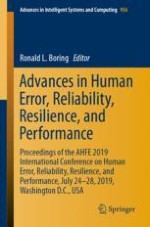2020 | OriginalPaper | Chapter
Relating the Learning Styles, Dependency, and Working Memory Capacity to Performance Effectiveness in Collaborative Problem Solving
Authors : Kaveh Sheikhrezaei, Craig Harvey
Published in: Advances in Human Error, Reliability, Resilience, and Performance
Publisher: Springer International Publishing
Activate our intelligent search to find suitable subject content or patents.
Select sections of text to find matching patents with Artificial Intelligence. powered by
Select sections of text to find additional relevant content using AI-assisted search. powered by
